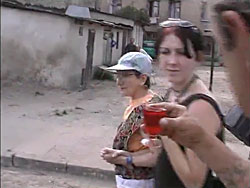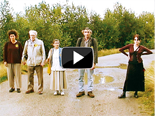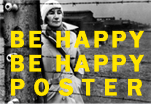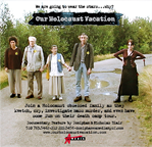 For one scene, Irena and the filmmakers went into Auschwitz at night.When sixteen year-old Irena goes on a family vacation to Poland, she didn't think it would be so heavy. Sure, her grandmother Tonia, who survived the Holocaust, is on the trip, and they will find out about her experience, but her father and uncle are also making a movie.
For one scene, Irena and the filmmakers went into Auschwitz at night.When sixteen year-old Irena goes on a family vacation to Poland, she didn't think it would be so heavy. Sure, her grandmother Tonia, who survived the Holocaust, is on the trip, and they will find out about her experience, but her father and uncle are also making a movie.
Welcome to "Our Holocaust Vacation," three generations on a roller coaster ride into history and family, produced, shot and edited by family members Nicholas and Doniphan Blair.
Called “one of the best Holocaust films I have seen” by Holocaust film scholar Elaina Viola, "Our Holocaust Vacation" has been shown over 375 times on PBS across America and at many schools and survivor associations. Now the filmmakers have added the "Our Holocaust Vacation" curriculum guide, the "Be Happy" poster, and the Juman Project, which continues the film's discussions of post-Holocaust Judaism, mysticism and politics.
"Our Holocaust Vacation" follows two teenage women pushed into the realms of the psychopath: Tonia during the war, who recounts her experiences with dignity and passion, and her granddaughter Irena, who is compelled to relive it, if just a little. For example, she goes at night with her dad and uncle into Auschwitz to film. In fact, the filmmakers break the barrier of regular movie making with their subjects and the citizens of Eastern Europe by staging some performance pieces, from walking with Jewish stars in a German town to giving away bread in Czech Republic.
“The film challenges genre conceptions and it challenges the audience,” explains Viola. This is why, perhaps, "Our Holocaust Vacation" was not accepted by major Jewish film festivals. Or perhaps it is because Tonia flirts with a German officer in a work camp, a story becomes the emotional climax of the film's many stories about the woman's side of war.
"Little acts of kindness kept us alive," says Tonia, who provided that kindness, as a nurse in the besieged ghetto hospitals, and received it: getting gifts of food from good Samaritans, falling in love with a young man on the way to Auschwitz.
No, Irena does not want to put on a Jewish star and march with her family through a German town. Yes, it seems abusive for her father wants her to do so or to take her into Auschwitz at night. But she comes to her own understanding as does her grandmother. Tonia telling her stories of love, healing and resistance to brute force and horror, right on the historical spots where they happened, proves cathartic.
 The family is offered a drink in the neighborhood where the Lodz Ghetto stood."The film was very moving, full of tears, some humor and above all, the love of a family which has the guts to go for a deep emotional experience," noted Ester Widman, of the National Association of Jewish Child Holocaust Survivors.
The family is offered a drink in the neighborhood where the Lodz Ghetto stood."The film was very moving, full of tears, some humor and above all, the love of a family which has the guts to go for a deep emotional experience," noted Ester Widman, of the National Association of Jewish Child Holocaust Survivors.
"Our Holocaust Vacation" provides a template for how one family healed and how humans can comprehend such history. Because of the presence of the teen character, the film is an good introduction to the subject for young people and has received high ratings from educators. The innovation of the "Our Holocaust Vacation" is continuing into the Juman Project, which is presented in multiple formats and is highly recommended for Jewish or historical awareness events, seminars or classes.
"Our Holocaust Vacation" is also available is a:
• Our Holocaust Vacation DVD: 84 and 58 minute versions
• Our Holocaust Vacation Curriculum Guide
• Be Happy, Be Happy: Poster and Fine Art Signed Seriograph
• The Juman Project: Mysticism, Religion, Science, Politics and Music in the Post-Holocaust Era


